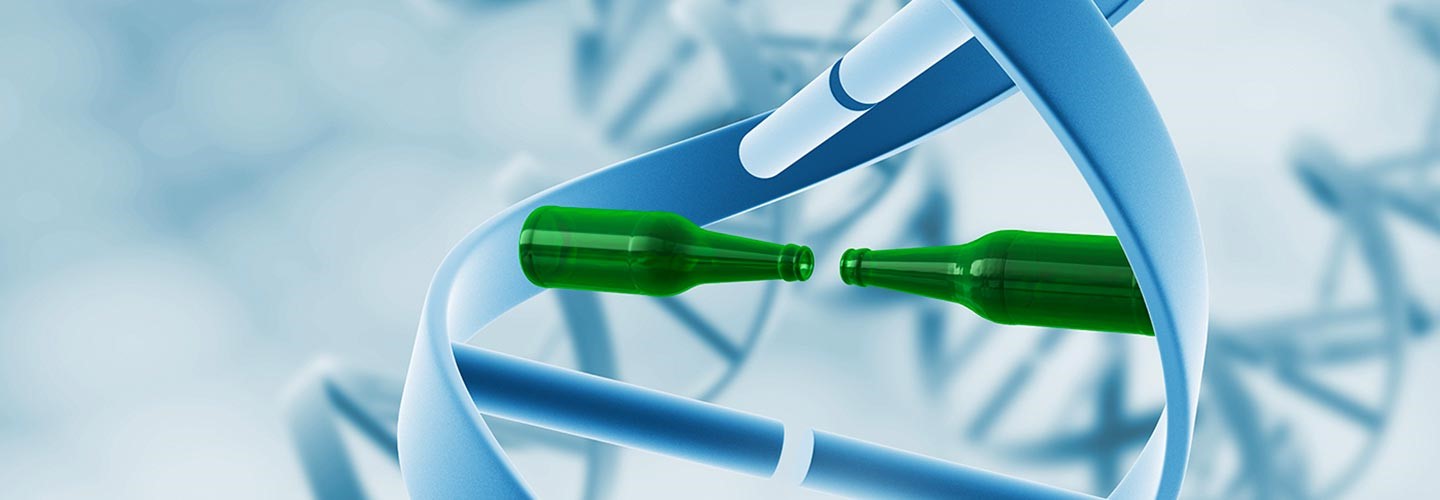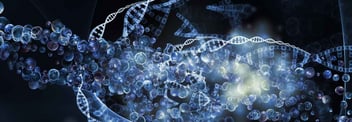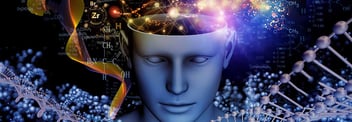DNA: I Am Who I Am… or Am I? – Session Fourteen
- Home
- Blog

Is Alcoholism Inherited? Can a Tiny Gene Help Treat It?
The GRIK1 Gene
“The blood of your parents is not lost in you.”
– Menelaus, The Odyssey, 8th century BC
“DNA + Environment + Triggers + Chance = Health vs. Disease. Test your GRIK1 gene if alcohol abuse runs in your family”
– -Bruce Alan Kehr, M.D.
Astonishing! Imagine for a moment that long ago, over 2700 years ago, Menelaus posited that “the blood of our parents” is inside of us, affecting our daily lives! Since alcoholism runs in families, comes from “the blood of our parents” so to speak, today we will focus on one gene, GRIK1, that provides clues as to why, and how we can treat its potentially devastating effects.
Reader, what’s your biggest “vice?” The habit you wish you could curb, but seemingly can’t? Is it the cigarette you light up after a long workday? Or maybe it’s that extra thirty minutes of television you grant yourself before heading up to bed. I was recently sitting in the window seat of a big Boeing airplane headed to see my daughter in California when I met a man I’ll call David. Before he began squeezing his duffel into the overhead compartment, he tossed a paper baggie on the seat next to mine—the seat he’d occupy in seconds. Now, studying people is my profession, and that comes with a certain curiosity even when I’m off the clock—so as motionlessly as I could, I turned my eye towards the contents in that paper bag. As it turns out, I needn’t have bothered. As soon as David sat down, he pulled down the tray and arranged the contents of the bag in a neat little line: nine single-shot bottles of whiskey, and one vodka to boot. “The vodka’s the chaser,” he said, turning to me with a grin. David’s habit was alcohol—and he showed no signs of slowing down.
In our current culture of myriad addictions and obsessions (cellphones, 24 hour news cycles, etc), it can be challenging to find the appropriate boundaries for our “guilty pleasures”. Perhaps nowhere is this more true than with alcohol consumption. Dependency can easily lead to addiction, and it can be difficult to find where the line between the two lies. That difficulty is compounded when, like David, we begin to see our guilty pleasures as character traits: fundamental parts of our identity that at times must be apologized for—but certainly can’t be changed. And, if we must try to change, we believe that transformation can only occur through sheer force of will. Reader, these are cultural myths we all hold in some way or another. But here’s the truth of the matter: Some of our so-called “guilty pleasures” have much less to do with our personal preference and more to do with what’s encoded in our very DNA. But if that makes you think they’re even less changeable than you had imagined, think again: In many instances, our DNA impacts our destiny only as much as we let it. Like thousands of tiny little puzzles, many of the genes in your body can be tweaked and fiddled with by external influencers, from foods to vitamins to prescription meds—to alter how these genes affect the structure and function of your cells. And this includes a little gene known as GRIK1—a gene that, if tweaked the right way, can reduce the destructive effects of alcoholism once and for all. Davids of the world, take note: You have the power to overcome the Goliaths (the seemingly all-powerful and insurmountable traits) that you think define you. You just have to be willing to learn how.
How GRIK1 Genetic Testing can Help Treat Alcohol Dependency
It was a long flight from Washington DC to San Francisco—I had been looking forward to relaxing into a good book for most of the route, but you know what they say about the best-laid plans. David was a gregarious man in his forties, and as we got to talking I couldn’t help but extend my curiosity towards the way he chose to talk about his alcohol dependency. “You know, I’ve tried rehab, I’ve tried yoga, I’ve dabbled in some of the AA stuff, even,” he said. “Call it a weak will or a strong taste for the stuff, but I’ve been drinking like this since I was 14—and I can’t imagine a world where I’d ever be able to let up.” A weak will—his words stuck with me, and reminded me of the blog I’d written just last week, on a gene known for contributing to weight gain. We are born into this life with a genetic code that can predispose us to many “habits” or “guilty pleasures” that are difficult to break free of not because we have a weak will, but because our genes drive our urges far more than many of us realize. But, as we know from studying epigenetics, environmental influences and lifestyle factors can play a major role in changing how our very genes express themselves, moment-to-moment.
When it comes to alcoholism, our genes can work against us in two ways. We know from a previous blog that a variation on our OPRMI gene—the gene responsible for regulating aspects of our experience of pleasure and pain—may predispose us to alcohol or opioid addiction. Similarly, a variant on our GRIK1 gene can make it easier for us to move from alcohol use to full-on dependency. The reason, though still hotly debated in scientific circles, seems to have everything to do with epigenetics. The GRIK1 gene encodes a neurotransmitter called “glutamate”—or more specifically, the kainite class of glutamate receptors. These receptors affect the release of glutamate, known as an “excitotoxic” neurotransmitter, as too much of it is “toxic” – damaging and destroying brain cells by damaging their energy-producing mitochondria, and causing excessive amounts of “oxidative stress.” When certain substances are abused over time (this would count as an epigenetic factor), there is an imbalance created in the process of neurotransmission that makes it more difficult to control drug-seeking behavior (see the link above for more information.) A particular variant on the GRIK1 gene makes this imbalance more likely in some individuals—which means that if they start a pattern of drinking, they will more easily find themselves locked in a pattern of abuse with the substance.
Genetic testing can help pinpoint the variant that contributes to alcohol dependency—which gives you greater control over the habits you might be building when it comes to alcohol. But that’s not the only way GRIK1 genetic testing can make a difference: it can also help determine a precise medication that could ease your addiction once and for all.
A Miracle Pill? Topiramate and the GRIK1 Gene
David mentioned several ways he tried to kick his alcohol habit—but they all involved willpower and having some measure of control over his own body. Now, these are things I advocate for in my own practice. But when your genes are working against you by aiding in the development and maintenance of a psychiatric disorder, willpower will only go so far. Many folks are already wary of the pharmacological industry—and I’m with them in certain respects (certainly not all, as many medications are life-saving!). But the truth is, there is a place for prescription medications in treatment, especially when used in the context of precision medicine. And, what many people don’t know, is that there is a pill that can become one of the pillars for treating alcoholism. And that pill happens to target the brain cell receptor created by the GRIK1 gene.
Topiramate was initially approved as an anti-seizure drug—but it has also been proven to be highly effective in helping those with an alcohol dependency or addiction kick their abuse to the curb. This does not always mean complete abstinence. In fact, for people like David, that can be a good thing. The drug simply helps individuals reduce their drinking habits to safer levels. In other words, we may not need to attach so much weight to this particular habit: by blocking the kainite glutamate receptor, the drug simply makes heavier alcohol consumption less enjoyable.
But here’s why genetic testing is so important in this particular case: Individuals with the c/c genotype on GRIK1 responded very favorably to Topiramate treatment—but those with the a-allele did not see a difference. There are other medications that help treat alcohol addiction—like Naltrexone, for instance. Thus, genetic testing on the GRIK1 gene illustrates what precision medicine is all about: determining which medication will be more likely to work based on your specific gene analysis.
Breaking Habits and Reclaiming Your Destiny
I’ll not forget for a long time how David seemed so resigned to his fate as an alcoholic. So many individuals feel powerless over their urges—but knowledge of where those urges are really coming from can be an empowering and life-changing gift. Genomind’s Genecept Assay can give you the keys to your own future by telling you what’s going on inside your brain cells and synapses, and what you can do to change it. DNA isn’t your destiny—and with the right tools in your toolkit, you can help determine the tools to use to break any bad habit. What’s more powerful than that?
DNA: I Am Who I Am… or Am I? Blog Series
- Does DNA Determine My Destiny?
- Tinker with Your Genes to Determine Your Destiny
- A Simple Cheek Swab Brings Good Karma
- Test Your DNA to Determine Your Reality
- The BDNF Gene: Use “Fertilizer” to Grow a Majestic ”Rainforest Brain”… and Introducing “GENiE” and “DNA 4 KIDS”
- The MTHFR Gene: “Manufacture” Your Way to Health and Happiness Featuring “DNA 4 KIDS” with “GENiE”
- The SLC6A4 Gene (Serotonin Reuptake Gene): Improve Your Mood and Anxiety through a Simple Cheek Swab Featuring “DNA 4 KIDS” with “GENiE”
- Tame that Emotional Roller Coaster Ride Genetic Testing for the ANK3 Gene and CACNA1C Gene Featuring “DNA 4 KIDS” with “GENiE”
- Is Addiction Inherited? Genetic Testing for the OPRM1 Gene, Opioid Abuse, and Alcoholism Featuring “DNA 4 TEENS” With “GENiE”
- Surf’s Up: Use Your Genetic Code to Ride the Stress Wave with Ease The COMT Gene Featuring “DNA 4 KIDS” With “GENiE”
- Mental Illness is not a Myth—and Human Genomics Proves It The DRD2 Gene and Dopamine Featuring “DNA 4 KIDS” With “GENiE”
- ADHD in the Age of Distraction The Tricky Genetics behind ADHD and ADRA2A Featuring “DNA 4 KIDS” With “GENiE”
- Overweight and Obesity – Is it Me, or My DNA? 5HT2C and MC4R: Can Your Genes Make You Fat?
- Is Alcoholism Inherited? Can a Tiny Gene Help Treat It? The GRIK1 Gene
- 2018 Women’s Health and Wellness Summit DNA Keynote Address
Related Information
- Learn about Genetic Testing
- Learn about Potomac Psychiatry
- Meet Our Doctors
- Contact Potomac Psychiatry
.png?width=144&height=144&name=Untitled%20design%20(34).png)



